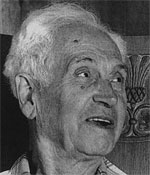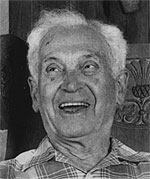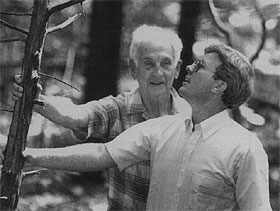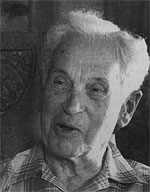Interview: Ernst Mayr

Ernst Mayr is one of the greatest influences on evolutionary biology since Darwin. Dr. Mayr was one of the architects of the evolutionary synthesis of the 1930s and 1940s, which unified biology by integrating Darwin's theory of natural selection with new discoveries in genetics, paleontology, and taxonomy. Dr. Mayr based his views on evolution mainly on relationships among bird species that he studied on Pacific islands. Now 89 years old, Dr. Mayr, professor emeritus at Harvard, is still going strong and generating exciting new ideas. His latest book, One Long Argument (Harvard University Press, 1991), analyzes Darwin's theories. l interviewed Professor Mayr at his summer cottage in New Hampshire.
Dr. Mayr, how did you become a naturalist?
I have been a naturalist, I would say, ever since I could walk. My parents were very much interested in nature and took me and my two brothers out to watch birds, to collect fossils, to find spring flowers and everything else. So I ardently followed all of these things, but particularly birds. Since I came from a medical family (there were four generations of medical doctors preceding me), I was supposed to be the medical doctor of my generation. So I went to medical school, but I also became a volunteer at the Berlin Natural History Museum, and that led to my giving up my medical studies. After I had my Ph.D., which I got at the age of 21, I was introduced to Lord Rothschild in England, who sent me on an expedition to New Guinea. While I was there, the American Museum of Natural History in New York needed an ornithologist on their expedition, which was cruising in the seas near New Guinea, and so I joined them. I spent the next nine months on a schooner in the Solomon Islands. It was two and a half years before I finally came back to Berlin.
Later I was invited by the American Museum of Natural History to come to New York for a year, but my temporary visiting job became a permanent job when the museum bought the Rothschild bird collection, and I stayed with the American Museum from 1931 to 1953. Then I became a professor at the Museum of Comparative Zoology at Harvard.
So you, like Darwin, were a naturalist on a major expedition in your early twenties. Tell us a little more about your journey and how that early fieldwork influenced your thinking about evolution.
My task in New Guinea, given to me by Lord Rothschild, was to find the home of some rare birds of paradise that had been collected by the plume hunters for hat decorations, but had not since been encountered. Each mountain range in New Guinea has its endemic species of birds. The mountains are like islands in the sky, as they have sometimes been called. Geographic speciation takes place on these mountaintops just as it takes place on islands in the ocean.
After New Guinea I came to the Solomon Islands, where we went on our schooner from island to island. There is no place in the world in which geographic speciation is as well demonstrated as in the changes from island to island in the Solomon Islands. And that, more than almost anything else, was the basis of my 1942 book Systematics and the Origin of Species, which was one of the books that contributed to the evolutionary synthesis of the 1930s and '40s. It is indeed true, just as Wallace had found in the Indonesian Islands, and Darwin in the Galápagos, that islands are the best place in which to demonstrate speciation. One of the things that I followed up later in life was to see if geographic separation also caused speciation on continents. Indeed it does. Wherever there are barriers, due to water, mountains, or vegetational changes, speciation can occur.
Can you provide some historical perspective about the evolutionary synthesis and your role in its development?
When I was a student in Germany, I was a Lamarckian, which shocks some people. But at that time it made more sense than the view of the Mendelians that all new species originate from macromutations and that a new species is formed at once by one individual becoming the first representative of the new species. The gradual speciation that I saw fitted in far better with Lamarckism.
In the 1920s, there was still total disagreement among biologists as to what was the truth about evolution and what were the mechanisms of evolution. The theory of natural selection was clearly a minority viewpoint. Then, rather rapidly, in the 1930s and '40s, all the difficulties seemed to evaporate and a modern picture of evolution originated.
The three major contributions of the synthesis were the following: First, it refuted all the opposing theories, such as Lamarckism, that believed there was some intrinsic force in organisms that would lead to improvement or evolutionary change and a more perfect adaptation. The second contribution was to supplement the evolutionary concepts of the geneticists of that period, who concentrated entirely on adaptive changes within a population. You won't find anything in their writings about the origin of evolutionary diversity. Adaptation and the origin of diversity are the two major components of evolution. My contribution to the evolutionary synthesis was to introduce the study of diversity, the explanation of species, of how they originate, and how one gets from there to the higher taxonomic categories. The third major contribution was that there were many disparate disciplines at that time and people in different fields were hardly on speaking terms with each other, like paleontologists and geneticists; the botanists were way outside. The evolutionary synthesis brought them together, and that's why the word "synthesis" is so often used for this unification of biology through the acceptance of Darwinian evolution.

Did you and the other architects of the evolutionary synthesis actually collaborate?
Curiously enough, very little. [Theodore] Dobzhansky and I saw each other a couple of times before I wrote my book, and I showed him my island birds. But otherwise we had very little contact. [George Gaylord] Simpson did his thing entirely by himself, and so did [G. Ledyard] Stebbins in botany. The major evolutionary theorists never had a joint symposium until after the synthesis was completed and they wrote their books independently.
Dr. Mayr, you mentioned the Darwinian stamp on the modern evolutionary synthesis. When did Darwin really begin to influence your view of the world?
Well, I wasn't nearly as much aware at that time that it was a Darwinian influence. I just gradually realized that natural selection can do far more than I thought when I was younger. I didn't read Darwin's Origin of Species until after I had published my Systematics and the Origin of the Species. But then, particularly in the 1960s, I became very much aware of the really great importance of Darwin.
And your latest book is about Darwin's ideas.
The reason I wrote this book is that most of the books on Darwin speak about Darwinism as if it was a single, monolithic theory. In reality, Darwin had a great many theories. What I've tried to do is to separate these major theories and discuss them individually: where Darwin got his ideas, how valid they were, when they were accepted by other people, and so forth. I've found in the literature that there are seven or eight different meanings of the word "Darwinism" for different people. In Darwin's own time, for instance, "Darwinism" meant evolution without supernatural causation. Nothing more, nothing less. Today, "Darwinism" means the theory of natural selection. But natural selection was almost totally ignored in Darwin's time.
Speaking of Darwin's time, if you could go back to that time and actually visit with Darwin, what would you ask him?
You will be very much surprised when you hear my answer. I would ask him about his relation to religion, to a belief in a personal God. Did his loss of belief precede or follow his development of the concept of natural selection? What went on in his mind, particularly in relation to general things like belief in religion, is something that he always carefully concealed in his writings, particularly since his wife, Emma, was a deeply devout person. But it is rather obvious from his handwritten notes that he didn't believe in a personal God. Furthermore, to me it seems obvious that he lost his belief in God at least a year, if not two, before he developed his theory of natural selection. So the claim that biology and a belief in natural selection is dangerous because it may make you lose your faith in God is not substantiated. That's a very important thing to know.

What could you tell Darwin that would help him with his ideas about evolution?
I would just convey to him what we know about genetic variation in populations, because that's the area where he was most puzzled and where he was most anxious to learn more and never succeeded.
Many of your books and articles highlight the importance of variation among individuals and contrast what you call "typological thinking" with population thinking. What is the issue here, and why is it so important to evolutionary theory?
Typological thinking, which is also sometimes called "essentialism," has a very long history. It goes back to the ideas of Plato, who spoke of the underlying eidos, the unchanging, ideal forms that underlie all the variable phenomena of this world. The variations observed are simply incomplete and imperfect manifestations or reflections of the eidos.
"Population thinking" is exactly the opposite. It says that there is no constant value to any variable population. Every individual is unique and is different from all other individuals. Even in the human species, with now 5 billion individuals, every single one of them is uniquely different. In the human body and in all animal bodies, most likely every cell is somehow or other individually different from every other cell. This emphasis on the variability of populations, on the uniqueness of the individual, is characteristic of the so-called population thinking.
Darwin hadn't completed his conversion to population thinking, though he had it essentially. You can never accept evolution by natural selection unless you have adopted population thinking. For a typologist, natural selection is ineffective, because the variation does not affect the underlying ideal.
You view physiology as being largely typological in its traditional approach. This must have important implications for medicine.
It certainly does. I remember that I once talked about population thinking to an audience in which there were several doctors, and one of the doctors got up and said, "I can't accept this! Unless I treat every patient as if he were 'normal,' just like all other patients, I wouldn't know what to do." This is one of the big difficulties in medicine. For instance, no two people react necessarily exactly the same way to particular drugs. So this variability of the human species is something that a modern doctor should be very much aware of.
Another point your books make is that it is the whole organism, the whole phenotype, that is the object of natural selection.
This is absolutely so. One of the greatest weaknesses of the mathematical geneticists was that they acted as if the gene was the target of selection. The gene is not the target of selection. A given gene can be highly favorable in one genotype and lethal in another context. Those who believed that the gene is the target of selection said that the larger a population, the more individuals a species has, the faster it would evolve, because it has a bigger reservoir of genetic differences. The naturalists said, we see just the opposite. We see that species with very large populations don't do anything in evolution. They may stay the same for 5, 10, or 25 million years. The most rapid evolutionary changes take place in small, isolated populations. The disagreement was strictly due to the fact that the two groups of people accepted different targets of natural selection.
How do you think new species most commonly arise?
We might as well start with a few words about what a species is. A population which does not interbreed with another population, even though the two occur at the same time and the same place, is a different species from the other population. Now, the question is how two populations acquire the characteristic that they don't fuse with each other, that they are, as we say, reproductively isolated. That is the problem of speciation.
Up to the 1930s and '40s, there was a widespread view that much of speciation is due to a group of individuals acquiring a new ecological niche at the same place and then becoming a different species. Darwin himself believed that this happens all the time. Analyzing the situation, I came to the conclusion that this must be very rare, and all the cases quoted in the literature could be much better explained as examples of geographic speciation, or as it is sometimes technically called, allopatric speciation.
There are two ways in which geographic speciation can take place. Either there is a continuous area somewhere in the range of the species in which a new barrier arises, for example, a new mountain range, or an arm of the ocean, or a new vegetational belt that prevents a meeting of the individuals on either side of this new barrier. That is the classical geographic speciation that has always been described in the literature. But in 1954, I published a paper, which I've always considered to be the most important paper I ever published in my life, in which I showed that a far more important process of speciation is when some founders, a few individuals, establish a new founder colony beyond the existing species border. This new founder population rapidly changes genetically and acquires the reproductive characteristics that are needed for becoming a different species. Then it can exist as a separate species even if comes again in contact with the mother species.
In these founder populations, more important genetic changes can take place than when you just separate a species into two large populations. In these rather large parts of the species, even when temporarily separated, not very much happens. The really important evolutionary changes probably happened in the populations that came out of founder populations. And that is why the paleontologists find so little evidence for the gradual origin of new species. They find a lineage that changes somewhat, but not very drastically, and then suddenly a new species originates somewhere else, next to it. [Niles] Eldredge and [Stephen Jay] Gould based their theory of punctuated equilibrium on my 1954 paper. The major point which they added to my analysis is that once a species has become widespread and successful, it no longer changes very much. It enters a stage of stasis. It may continue in this unchanging condition for many millions of years until finally becoming extinct.

The theory of punctuated equilibrium also maintains that new species usually arise relatively rapidly. Does this contest the traditional Darwinian view of gradual evolution?
A mistake people make is thinking that if something evolves very rapidly, it is no longer Darwinian gradual evolution. But as long as the evolution occurs at the populational level and not at the level of individuals, then it is gradual evolution, occurring over many generations. Some paleontologists call the origin of a species relatively sudden if it takes place during 1% of the total lifespan of the species. But that 1% is 50,000 years or 100,000 years in a species living 5 or 10 million years. Hardly anyone else would call that sudden.
Can you speculate about how your ideas on geographic speciation apply to the origin of humans?
If you look at the fossil record of the hominids, you find that every new type did exactly what the theory of speciational evolution postulates. They turned up suddenly and are not a direct continuation of the previous lineage. There's nothing intermediate between Australopithecus africanus and Homo habilis. There's nothing really in between Homo habilis and Homo erectus. My interpretation, which the anthropologists are beginning to accept more and more, is that hominids at any time were geographically variable and had isolated groups of populations. Invariably, one of these was the next step in human evolution.
What's our current evolutionary status?
All populations of the human species are heavily exchanging genes with each other, and there is no isolated population that could become a different species. Any very widespread species is usually evolutionarily inert, more or less.
You once wrote, "It's a miracle that humankind ever happened."
Well, that was broadly speaking. On Earth, there have probably been more than a billion species of organisms since the origin of life. How many of these billion species have become humans? One. A chance of one in a billion is almost like a miracle. And even that one human species might never have happened. We might have had several billion species on Earth without even one of them acquiring the characteristics of mankind. The presumption that wherever there is life and evolution, then there must eventually be intelligence is teleological thinking.
I argue with the people who want to receive radio signals from intelligent life from all over the universe. I said that the chance of our ever getting such signals is so small that I would consider it indistinguishable from zero. Let's say we had a billion species on earth. Only one developed the intelligence of mankind.
And then we have had at least 15 civilizations on Earth, but only one of them produced the electronic revolution that can send radio signals into space. Furthermore, how many planets are there that can produce life? The physical constraints are incredible. The fact that one of the nine planets in the solar system produced conditions suitable for life doesn't mean that of the next thousand planets, even one will have the conditions suitable for life.
I've made up a little story to illustrate this point. Imagine when the Earth originated there was an intelligent civilization somewhere in the universe, and they said, "Well, let's send signals to this planet; it looks very promising." So for the 3.8 billion years that the Earth had life they sent signals to the Earth and no response ever came. Finally, in the year 900 they said, "We'll send signals for another thousand years, and if we don't have a response by then we'll give up." Along came the year 1900 and no signal had been received. So they said, "No, there's obviously no intelligent life on Earth," and they quit just half a century before we developed the capability to respond. If you multiply all these high improbabilities, you come to a figure which, as I said, is indistinguishable from zero.
You've also written that we humans have extraordinary responsibility because of our uniqueness as a species.
Yes, humans are basically responsible for all the bad things that at the present time happen to our planet, and we are the only ones who can see all these things and do something about them. If we would stop the human population explosion, we would have already won two-thirds of the battle. That we live here just as exploiters of this planet is an ethic that does not appeal to me. Having become the dominant species on our planet, we have the responsibility to preserve the well-being of this planet. I feel that it should be a part of our ethical system that we should preserve and maintain and protect this planet that gave origin to us.
©2005 Pearson Education, Inc., publishing as Benjamin Cummings